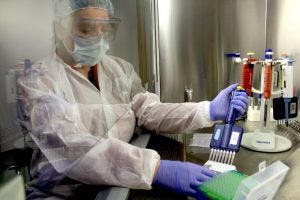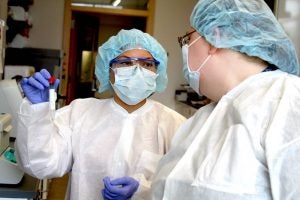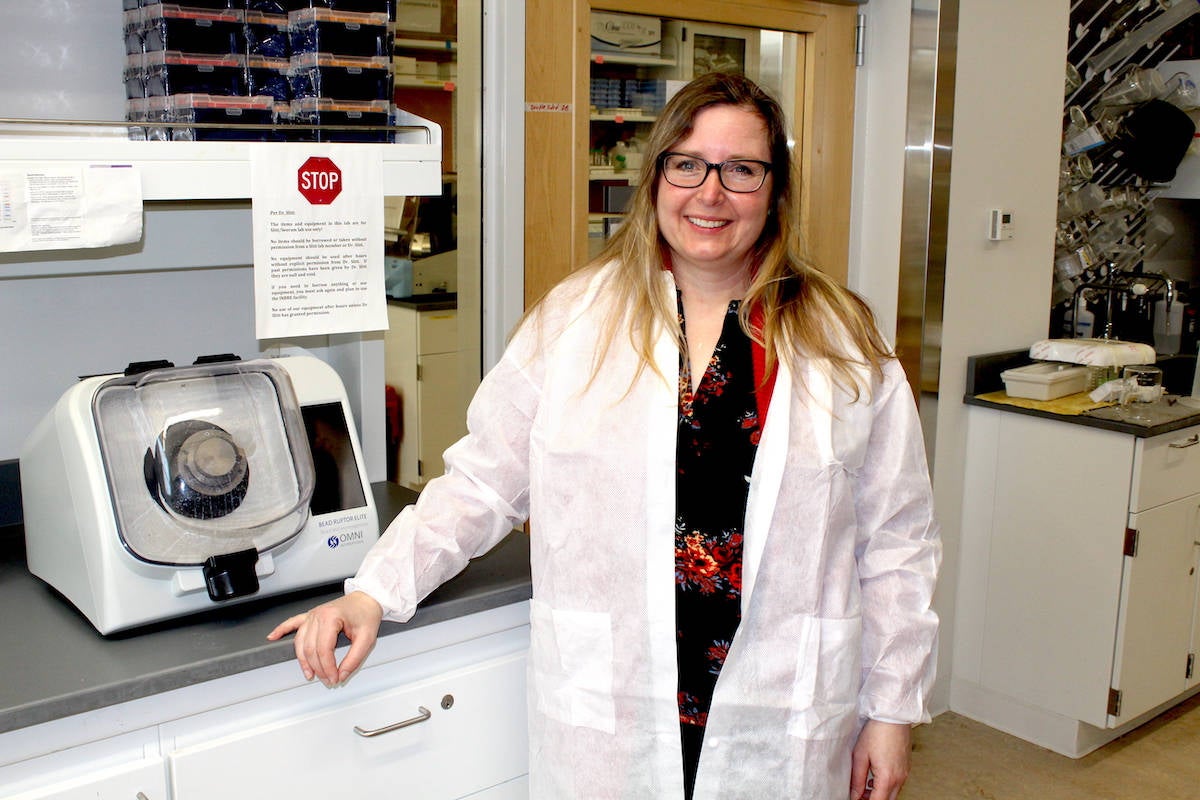Saliva-based test developed by Professor Angela Slitt and her team is fast, accurate and low-cost
By Elisa Mason
By now, most people have either seen or received the invasive COVID-19 test with the gigantic swab inserted into the nasal cavity. That long, thin swab collects a sample of the potentially infected cells in the area of the body where the virus has an ideal environment to invade and replicate. The sample is then transported to a lab for analysis.
The two types of COVID-19 tests approved by the FDA thus far both utilize a technique called polymerase chain reaction (PCR) to detect the virus. The PCR-based tests have been touted because of their sensitivity. However, this mechanism still leaves room for improvement. In fact, this method is susceptible to false negative results if the specimen sample is damaged before it has a chance to be amplified by the PCR test.
 University of Rhode Island (URI) Professor of Biomedical and Pharmaceutical Sciences Angela Slitt and her team have developed a new COVID-19 test that addresses and overcomes the accuracy challenges. The URI coronavirus test can be conducted simply and easily, and process the samples quicker and at lower cost than the current tests being used.
University of Rhode Island (URI) Professor of Biomedical and Pharmaceutical Sciences Angela Slitt and her team have developed a new COVID-19 test that addresses and overcomes the accuracy challenges. The URI coronavirus test can be conducted simply and easily, and process the samples quicker and at lower cost than the current tests being used.
“With minimal scientific equipment, we can increase our capacity in the United States and in developing countries and put tools in people hands that they can use,” Slitt said.
Additionally, based on experiments Slitt completed, she believes the team’s method has the potential to match and improve upon the PCR technique’s sensitivity. Her test has the potential to be able to correctly identify a positive result where the alternative test produces a false negative. The team has validated the assay in collaboration with the Rhode Island Department of Health by using standard reference materials and specimens from the health department.
 The team also includes a world-renowned company from Waltham Massachusetts, Thermo Fisher Scientific. The company’s role is to validate the team’s test and to provide the supply chain for distribution. With financial support from the URI President’s Office, Professor Slitt, the College of Pharmacy, and the URI Research Foundation have worked together to launch a special laboratory that will provide thousands of test results per day. This service lab will be rapidly staffed with the expertise and technology to provide reliable, valid test results, and URI Research Foundation is exploring the possibility of applying for Emergency Use Authorization through the FDA.
The team also includes a world-renowned company from Waltham Massachusetts, Thermo Fisher Scientific. The company’s role is to validate the team’s test and to provide the supply chain for distribution. With financial support from the URI President’s Office, Professor Slitt, the College of Pharmacy, and the URI Research Foundation have worked together to launch a special laboratory that will provide thousands of test results per day. This service lab will be rapidly staffed with the expertise and technology to provide reliable, valid test results, and URI Research Foundation is exploring the possibility of applying for Emergency Use Authorization through the FDA.
When the pandemic hit the U.S., Slitt and her team began working on a method to bolster the national coronavirus response by tweaking the mechanisms already being employed by Slitt’s research in the Sources, Transport, Exposure, and Effects of PFASs (STEEP) lab at URI, funded by the National Institutes of Health Superfund Research program. Since her PFAS test ultimately is used to look at changes in genetic material, Slitt reasoned that this research could be adapted to identify coronavirus in human cells.
Slitt credits one of her former Ph.D. students, Ogochukwu Amaeze, a Fulbright scholar from Nigeria, with the initial inspiration to think about harnessing the lab’s technology to detect the COVID-19 virus. It was through mentoring Amaeze that Slitt realized the stark difference in scientific equipment and capacity between the United States and Nigeria. As the pandemic continued to grow and high-end equipment became sought after commodities, she thought about simpler and cheaper solutions for Sars-CoV-2 testing. She reflected on the bond between her teammates, and the hard-work, long-hours and late nights together – during the early weeks of the pandemic – to meet this huge need for the community.
“We’ve experienced high and lows, and really the lesson learned is that a good team perseveres,” said Slitt, adding that such tenacity is foundational to the achievements made by the research team thus far. The implications for a novel COVID-19 testing technique are far-reaching for the global pandemic.
“It would be advantageous for other parts of the world, where PCR machines aren’t so common and micropipetters are hard to come by,” she said.
Increasing access to coronavirus testing for underserved countries sits high on Slitt’s priority list. While the method has not yet been approved by the FDA, she remains hopeful that this will happen soon. Importantly, the University will be able – very soon – to use this test for effective risk surveillance purposes for its own students, faculty and staff. URI sees this homegrown test as a key part of its strategy to safely meet its core teaching and research missions in semesters to come.
This article originally appeared in URI’s research magazine, Momentum.

